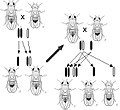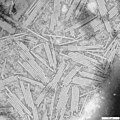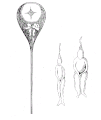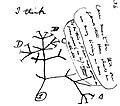Portal:Biology
Biology is the scientific study of life. It is a natural science with a broad scope but has several unifying themes that tie it together as a single, coherent field. For instance, all organisms are made up of at least one cell that processes hereditary information encoded in genes, which can be transmitted to future generations. Another major theme is evolution, which explains the unity and diversity of life. Energy processing is also important to life as it allows organisms to move, grow, and reproduce. Finally, all organisms are able to regulate their own internal environments. (Full article...)
Selected article -
The history of life on Earth traces the processes by which living and extinct organisms evolved, from the earliest emergence of life to the present day. Earth formed about 4.5 billion years ago (abbreviated as Ga, for gigaannum) and evidence suggests that life emerged prior to 3.7 Ga. The similarities among all known present-day species indicate that they have diverged through the process of evolution from a common ancestor.
The earliest clear evidence of life comes from biogenic carbon signatures and stromatolite fossils discovered in 3.7 billion-year-old metasedimentary rocks from western Greenland. In 2015, possible "remains of biotic life" were found in 4.1 billion-year-old rocks in Western Australia. There is further evidence of possibly the oldest forms of life in the form of fossilized microorganisms in hydrothermal vent precipitates from the Nuvvuagittuq Belt, that may have lived as early as 4.28 billion years ago, not long after the oceans formed 4.4 billion years ago, and after the Earth formed 4.54 billion years ago. These earliest fossils, however, may have originated from non-biological processes. (Full article...)
Selected picture -

Major topics
Selected biography -
For the French Napoleonic War General see Marshall Étienne Macdonald
Marshall McDonald (October 18, 1835 – September 1, 1895) was an American engineer, geologist, mineralogist, pisciculturist, and fisheries scientist. McDonald served as the commissioner of the United States Commission of Fish and Fisheries from 1888 until his death in 1895. He is best known for his inventions of a number of fish hatching apparatuses and a fish ladder that enabled salmon and other migrating fish species to ascend the rapids of watercourses resulting in an increased spawning ground. McDonald's administration of the U.S. Commission of Fish and Fisheries was notably free of scandal and furthered the "protection and culture" of fish species throughout the United States. (Full article...)
General images -
Did you know -

- ... that the p19 protein (dimer pictured) evolved in an arms race between plants and viruses?
- ...that there are about a million nephrons in a human kidney?
- ... that the semi-aquatic grasshopper Cornops aquaticum is being trialled in South Africa as a biological control agent for the invasive water hyacinth?
Related portals
Categories

Anatomy - Anthropology - Astrobiology - Biochemistry - Bioengineering - Bioinformatics - Biotechnology - Botany - Cell biology - Conservation biology - Developmental biology - Ecology - Environmental science - Evolutionary biology - Genetics - Mathematical biology - Medicine - Microbiology - Immunology - Molecular biology - Mycology - Neuroscience - Paleontology - Palynology Parasitology - Pharmacology -
Phylogenetics - Physiology - Systems biology - Taxonomy - Toxicology - Virology - ZoologyMore topics
WikiProjects

WikiProjects connected with biology:
A complete list of scientific WikiProjects can be found here. See also Wikispecies, a Wikimedia project dedicated to classification of biological species.


















































